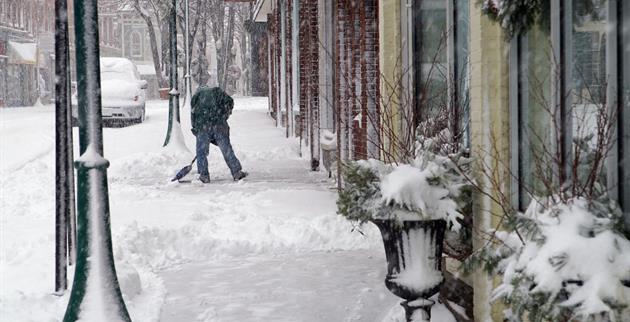Best Practices: Protect Your Business from Winter Weather


To best protect your business, property and employees from such disasters, it is a critical step to formulate a comprehensive disaster recovery plan.
Winter weather may not be completely unavoidable, but according to the Insurance Institute for Business and Home Safety, there are ways to reduce those winter risks! Read on for tips on how to monitor and protect your business during those unpredictable
winter months.
The Northeast can be exposed to a variety of winter weather; from blizzard conditions and freezing rain, to phenomena like thunder-snow are all awaited every season. The days where a snowstorm meant no school are long gone for business owners, and they
must prepare for whatever havoc the storm might wreak.
Common winter threats to businesses (and homes, alike) include:
- Injuries and illnesses
- Property damage
- Power loss
- Communications disruption
- Compromised access to the facility
- Difficulty obtaining transportation, and increase potential for accidents
Anticipating poor winter weather and properly preparing a business for emergency situations are the keys to protecting your business, property and employees.
Where to start?
First, understand the exposure to the climate in your geographical location. Your area may experience cold weather for significantly longer periods of time, and can lead to dangerously hazardous conditions outside, as well as inside your commercial
building:
Burst pipes – The leading cause of property damage.
Prevention: Maintain proper insulation and a minimum interior temperature of 55 degrees Fahrenheit. Monitor your thermostat to ensure it doesn’t dip below 40 degrees. Seal all cracks, holes, windows, doors, and other openings on exterior
walls with caulk or insulation to prevent cold air from getting through those cavities.
Smaller commercial properties might benefit from allowing faucets drip during extreme blasts of cold weather. If freezing does occur, the drip will relieve pressure buildup in the pipes between the ice blockage and the faucet.
Excess snow and ice – This could potentially put a building’s structure at risk of failure.
Prevention: While there is no way to protect a roof from accumulating snow, once the storm has passed, you can still protect your business by doing a visual assessment to see if excess snow removal is necessary. Hire a professional to inspect and
remove the snow if it is not safe to remove it yourself.
Snow drifts and sliding snow are also hazards. Businesses are likely to see concentrated snow accumulations (snow drifts) around roof protrusions, mechanical units, elevator and stairwell shafts, parapets, chimneys, and adjacent taller buildings. Sliding
snow tens to fall onto a lower roof, if your building has one, and overloads the structural deck and frame.
Ice Dams: Drains and gutters – If water does not properly drain off a roof, this could re-freeze and create additional loads to a roof and cause interior water damage.
Prevention: Throughout the winter season, periodically remove debris (such as leaves) that may prevent drainage of water. During the off-season, hire a qualified licensed contractor to verify that you have adequate drainage capacity!
Power outages – Can greatly reduce business operations if normal power is interrupted.
Prevention: Generators are an integral part of the preparedness planning process for businesses of every size. They can be especially crucial when temperatures are below freezing, leaving your business vulnerable to internal temperature drops.
Backup power can help maintain a consistent building temperature and reduce the risk of freezing pipes.
Failing to prepare for the winter can be the difference between seeing the next winter or not. To best protect your business, property and employees from such disasters, it is a critical step to formulate a comprehensive disaster recovery plan. Make sure
you include Preferred Mutual in that plan! Talk with your independent agent today to ensure that you have the protection and peace of mind you need to Live Assured.
This information is intended for educational purposes only and is not legal advice and/or an authoritative guide.